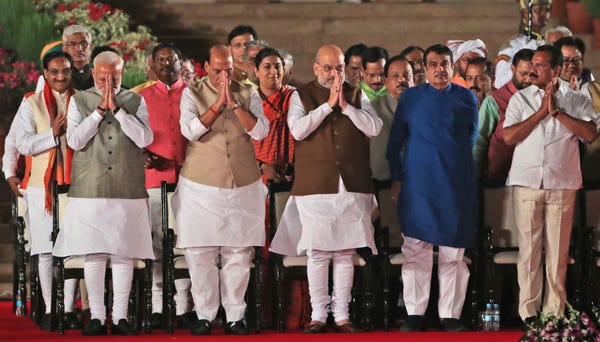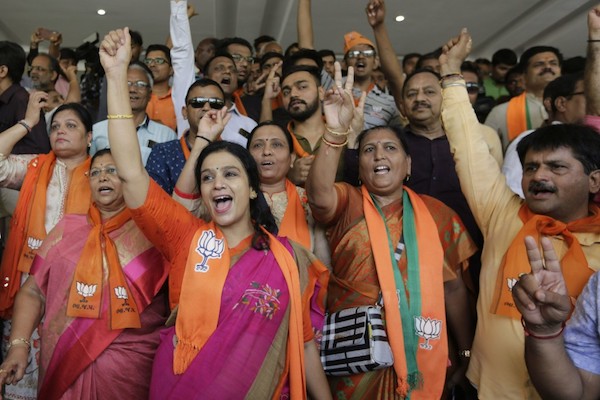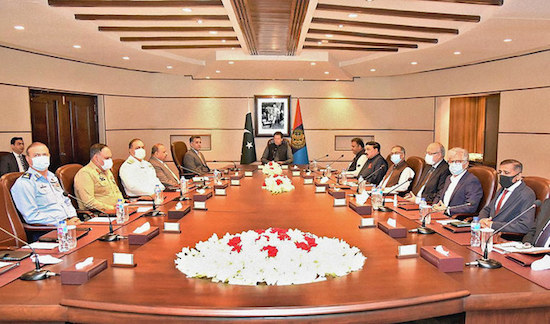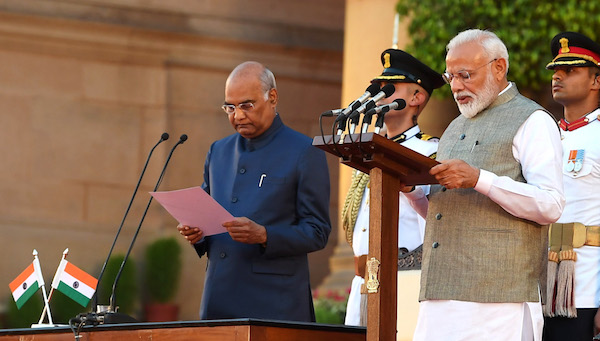Narendra Modi has scored an expected, yet dramatic, election victory. Modi is the first non-Congress prime minister in India to return to power after a full five-year term. It was a well participated election; about 67 percent of more than 900 million eligible voters cast their ballots. Bharatiya Janata Party (BJP) contested the election on issues of national security and a hardline Hindu agenda. The National Democratic Alliance (NDA) led by the Hindu nationalist BJP has won around 303 of the 542 seats that went to the polls. The party or coalition with a simple majority (272 seats) is invited to form the government.
Modi won because the Congress allowed him to. The opposition United Progressive Alliance (UPA) led by the Indian National Congress (INC) has won less than 100, while the party itself has taken about 52 odd seats. In 2014, the Congress had won 44 seats. Dynastic politics of INC is clearly fading out, at least for the time being. “Narendra Modi and the BJP have won,” said Rahul Gandhi, leader of the crushed Congress Party. He even lost his own seat in Amethi, in Uttar Pradesh, which his family’s political dynasty had held for decades, but won a second seat he contested in Wayanad, Kerala. Modi is voted back to power as the “young Indians believed they had no credible alternative”.
And here’s how the international media covered Modi’s victory.
“India’s soul lost to a dark politics one that views almost all 195 million Indian Muslims as second-class citizens”.
The New York Times has reported: “Exceeding all expectations, Prime Minister Narendra Modi’s party took a commanding lead in the country’s parliamentary elections”. “Modi deployed with terrible effect false claims and partisan facts,” the article added.
Pankaj Mishra in a piece for the New York Times under the caption “How Narendra Modi Seduced India With Envy and Hate” wrote: “Over five years of Modi’s rule, India has suffered variously from his raw wisdom”. “From devastating the Indian economy to risking nuclear Armageddon in South Asia, Modi has confirmed that the leader of the world’s largest democracy is dangerously incompetent.” “India under Modi’s rule has been marked by continuous explosions of violence in both virtual and real worlds”. “Modi’s appointed task in India is the same as that of many far-right demagogues: To titillate a fearful and angry population with the scapegoating of minorities, refugees, leftists, liberals and others while accelerating predatory forms of capitalism.” Mishra added “The prime minister has won re-election on a tide of violence, fake news and resentment”.
record-high unemployment rate, a slowing economy and widespread agrarian distress, Indians overwhelmingly decided to give Modi and his Party a second chance to put the country back on track.” “The slowdown in economic growth could still have emerged as a possible flashpoint during the elections. But the February suicide attack on Indian paramilitary forces in Pulwama and the government’s subsequent response which included ordering air strikes on a terrorist camp in Pakistan helped marshal vast amounts of support for Modi.” “The BJP targeted the Indian millennials, who have largely grown up with social media, as carefully designed memes praising Modi went viral on Facebook and WhatsApp praising him for the terror strikes”. Vivan added that Modi was voted back to power as the “young Indians believed they had no credible alternative”.
Pakistan’s daily Dawn editorially commented that “communal politics in India has triumphed in an age that will define the future of the republic”. “The results are astounding, and depressingly show that religious hatred and sectarian politics can be exploited to lure voters.” The daily added that the “focus must now turn to a practical way forward for sustainable peace in the subcontinent”.
The News International reported: “If Modi has won despite the long history of failures on the economic front, bad governance and the open war on religious minorities, it is because the opposition, especially the Congress, allowed him to.” “If the BJP and Modi have won this election, they perhaps deserved to win. They put in a great deal of hard work and have had the hunger to win.” “While we cannot ignore the epic lies, obfuscation, jingoism and hate that the BJP used against Indian Muslims and Pakistan to win this election, you have to acknowledge that the opposition failed to call Modi’s bluff and expose his failures on every front,” it stated.

Modi termed his victory as a triumph by and for ordinary Indians, over those who write off the poor and down trodden. “If someone is victorious, it is India,” “If someone is victorious, it is democracy. If someone is victorious, it is the electorate”, Modi declared in his victory speech.
Through these Indian elections, Quaid-i-Azam’s “Two Nation Theory” has been endorsed, yet once again, by a landslide affirmation. Modi’s communal share of the vote is Hindu vote around 60 percent and Muslim, Christian and Sikh vote around 13 percent. Never has Pakistan elected a religious bigot as PM and India has done it for the second time. Sustained rise of Hindutva fascism among the “secular” electorate of India presents an interesting case study.
A book entitled “Majoritarian State: How Hindu Nationalism is changing India” by Christophe Jaffrelot was launched in New Delhi on 26 April 2019. The book consists of contributions from leading scholars of Indian politics and highlights that RSS is violently tearing apart Indian communities and institutions systematically.
In run-up to these elections, India-Pakistan relations took a nosedive after the Pulwama attack and Indian air force’s violation of Pakistani air space it was responded well by Pakistan Air Force, by shooting down two Indian aeroplanes and capturing a pilot alive. This resulted in a war hysteria in South Asia which was used by Modi as an election campaign tool. He assumed the moniker Chawkidar (watchman) as his twitter handle and his election win is largely credited to aggressive tone and tenor against Pakistan.
Besides, Modi’s election campaign was anchored around the promises to build a temple in Ayodhya where Babri Mosque was demolished removing special status of Indian occupied Kashmir and rejection of Muslims as native Indians. Not a single Muslim candidate was given ticket by BJP. RSS has already claimed credit for the election victory with a demand that Modi has to deliver on all communal focused election promises in haste and any delay will not be acceptable to them.

Prime Minister Imran Khan conveyed his felicitations “I congratulate Prime Minister Modi on the electoral victory of BJP and allies. Look forward to working with him for peace, progress and prosperity in South Asia”. Responding to PM Imran’s congratulatory message on winning the elections, Modi thanked his counterpart and added that he had “always given primacy to peace and development” in the region. Nonetheless, in practice Narendra Modi evaded meaningful engagement with Pakistan, many a times, on flimsy grounds, even some were engineered through false flag operations, promptly blamed on Pakistan. Since assuming the Prime Minister ship in August last year, Imran Khan repeatedly reached out to India for the resumption of peace talks on all outstanding issues. Imran Khan had said in his very first speech that if India takes one step forward, we would take two steps forward.” The Modi administration, however, spurned those offers.
Any hope for reengagement was dealt a fatal blow when India sent fighter jets into Pakistan following the Pulwama attack in February. The two countries were on the brink of a war when Pakistan retaliated with airstrikes delivering weapons inside the Indian territory. While the two countries pulled back from the brink after hectic efforts of influential countries, Pakistan decided not to make any further overtures till the elections in India were over. Now, Imran Khan’s government is considering options on how to resume talks with India. There is optimism about the prospects of resumption of talks. The reason for this optimism stems from the fact that new Indian government is unlikely to follow the pre-election rhetoric.
Talking to foreign journalists in April, PM Imran had said that there might be a better chance of peace talks with India if Modi returned to power. “If the next Indian government is led by the opposition Congress party, it might be too scared to seek a settlement with Pakistan over Indian-occupied Kashmir (IoK), fearing a backlash from the right” “Perhaps if the BJP wins, some kind of settlement on Kashmir could be reached.” His statement had stirred a heated debate both in Pakistan as well as in India, where Modi’s opponents mocked him as Pakistan’s ally. In Pakistan, opposition parties had criticized PM Imran for making an ‘undiplomatic statement’ and also supporting Modi despite his hostile policies.
Now, speaking on Pakistan Television, Foreign Minister Qureshi has called upon India to come to the negotiating table and engage Pakistan for the sake of regional peace. He said that “war has always brought destruction and cannot be considered as an option, particularly when both the countries are nuclear powers.”
Pakistan is ready for a dialogue. It has started preparation for re-engagement with Re-Modi-ized India. New Ambassador to India has been appointed and appointing a National Security Adviser (NSA) is on the cards to revive ‘backchannel’ with India. In 2015, the two NSAs were instrumental in breaking the ice. Then the leadership of the two countries had employed their respective NSAs to communicate on important issues. The two held meetings in Bangkok leading to the agreement between the two foreign ministers for the resumption of composite dialogue.
In a welcome move, the two foreign ministers have held an informal chat on the side-line of Shanghai Cooperation Organization (SCO) in Bishkek, Kyrgyzstan on May 22. In a sign of de-escalation in tensions between Pakistan and India, the foreign ministers shook hands with each other. Both discussed matters of mutual interest during an informal interaction. The Foreign Office confirmed. “Swaraj complained about bitter statements and she also brought sweets so “we can speak in a sweeter tone,” Qureshi was quoted as saying. “We’ve however reiterated our desire for a peaceful resolution of all outstanding issues between the two countries,” he added. “Today [I] met Sushma Ji. She had a complaint that we sometimes talk in a bitter manner. She brought sweets today so we could also speak sweetly,” Qureshi was quoted as saying by the Foreign Office. Qureshi “made it clear to her that we want all the matters resolved through dialogue. Foreign Ministers were initially scheduled to meet on the side-line of the United Nations General Assembly in New York last September. However, New Delhi had scrapped that meeting just a day after agreeing to it, and had cited “unclean intentions” on Pakistan’s side as the reason for doing so.

In Islamabad, Prime Minister Imran Khan chaired a meeting of the National Security Committee, on May 22, to discuss internal and external security situation. Key issues included the current state of Pakistan-India ties.
Hopefully, India would soon roll out Confidence Building Measures which it had been holding back to appease its hard line vote bank, like holding of SAARC summit in Islamabad, reengaging the peoples through sports, educational and cultural exchanges, descaling India’s state sponsored terrorism in IoK. India needs to understand that voice of Kashmiris cannot be suppressed in this modern era of electronic media and the internet. Kashmiris are struggling for their right to self-determination in line with UNSC resolutions. Hopefully, India would also rescind the usage of the likes of Kulbhushan Jadhav, who had confessed that he was involved in subversive activities in Pakistan. India also needs to demonstrate statesmanship by agreeing to set-up court of arbitration on all Indus Water Treaty related disputes.
It is time for Narendra Modi to transcend above petty politics and think about evolving his legacy, and what could be a better legacy than contributing towards sustainable peace in South Asia. It’s a billion dollar question whether Modi will be able to reign in the RSS lobby within his party or continue to drum up anti-Pakistan and anti-China sentiment to appease the hardliners, and keep linking legitimate struggle by Kashmiris with terrorism, while pursuing abrogation of Articles 370 and 35A of Indian constitution with regard to special status of Kashmir, and keep sponsoring stupidities like majoritarian high handedness through cow vigilante, Ghar Wapsi, construction of Ram Temple over the charred ruins of Babri masjid, rewriting of history text books for school children, renaming of historic monuments in an effort to undo the historic realities etc.
We in Pakistan shall watch with eagerness to see an inclusive politician Modi emerging out of his Divider in Chief image at domestic level, and embracing statesman’s role at interstate level. Personality traits of Modi are firmly ground in communal politics which are likely to come back in circles to haunt him moreover, he will remain amenable to compelling pressure form the RSS. Had Modi not won a landslide victory in these elections there was a possibility that he would be inclined to dialogue and statesmanship but now, it is a distant possibility. Re-election of Modi with historic and unprecedented Indian voter support will have a far-reaching impact on the regional situation especially on balance of power in South Asia. It will impact peace talks in Afghanistan and ongoing Iran-USA tensions. India-China and India-Russia relations may also see a significant change. All these have to be taken into consideration to protect the interests of Pakistan and devise a well-thought strategy. Prime Minster Imran Khan should not be in an indecent hurry to dole out concessions to Modi. For the time being, he should hold his horses and follow a cautious policy.





